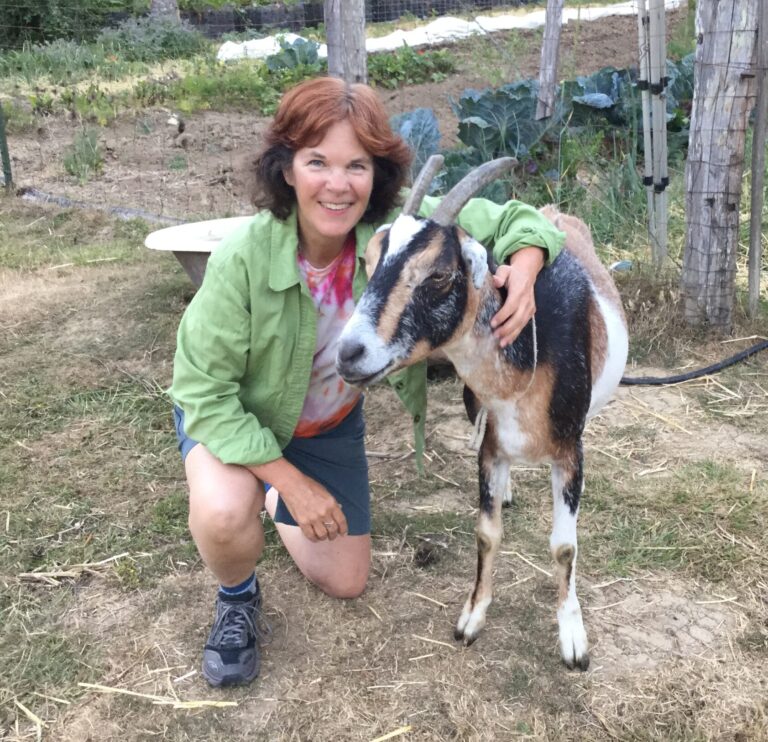My thirtieth farm was Myrtle Glen Farm in Myrtle Point, Oregon.
The Farm
The farmers are Micha and Dan. Micha grew up in Woodinville, Washington, which is just on the other side of Lake Washington where I grew up. During her youth, she was on the Olympic track as a gymnast, but she eventually decided that wasn’t for her. Dan grew up in Northern California. They shared an interest in documentary film making, which led them to UC Santa Barbara, where they met. They wanted to start a farm one day and thought Eugene, Oregon would be a good place for that. While doing film making in Eugene, they started researching farming and gardening methods.
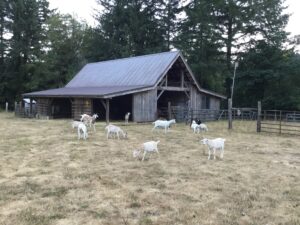 Outside of Eugene was a long-established WWOOFing farm called Myrtle Glen Farm. (When I was looking for my very first WWOOFing farm in 2013, I’d emailed this farm. The previous owner was one of the few hosts who replied. He had no availability at the time but said to contact him later in the summer, but I was off in the Southwest by then.) Micha and Dan visited this farm and liked what they saw. In 2014, when the owner decided to sell the property, Micha and Dan jumped at the opportunity to start their dream. By purchasing Myrtle Glen, they got a ready-made farm. The twenty-seven acres included an orchard, pasture, berry bushes, a pond for ducks, vines of table grapes, goats, chickens, ten acres of one hundred-year-old forest, and a beautiful house with an established Airbnb. Micha and Dan put in the labor, by pulling out tenacious grass to make flower beds, to add artistic flair to the property.
Outside of Eugene was a long-established WWOOFing farm called Myrtle Glen Farm. (When I was looking for my very first WWOOFing farm in 2013, I’d emailed this farm. The previous owner was one of the few hosts who replied. He had no availability at the time but said to contact him later in the summer, but I was off in the Southwest by then.) Micha and Dan visited this farm and liked what they saw. In 2014, when the owner decided to sell the property, Micha and Dan jumped at the opportunity to start their dream. By purchasing Myrtle Glen, they got a ready-made farm. The twenty-seven acres included an orchard, pasture, berry bushes, a pond for ducks, vines of table grapes, goats, chickens, ten acres of one hundred-year-old forest, and a beautiful house with an established Airbnb. Micha and Dan put in the labor, by pulling out tenacious grass to make flower beds, to add artistic flair to the property.
The goal of their farm is to have a sustainable business, with a focus on growing nutrient dense foods for themselves and their Airbnb guests.
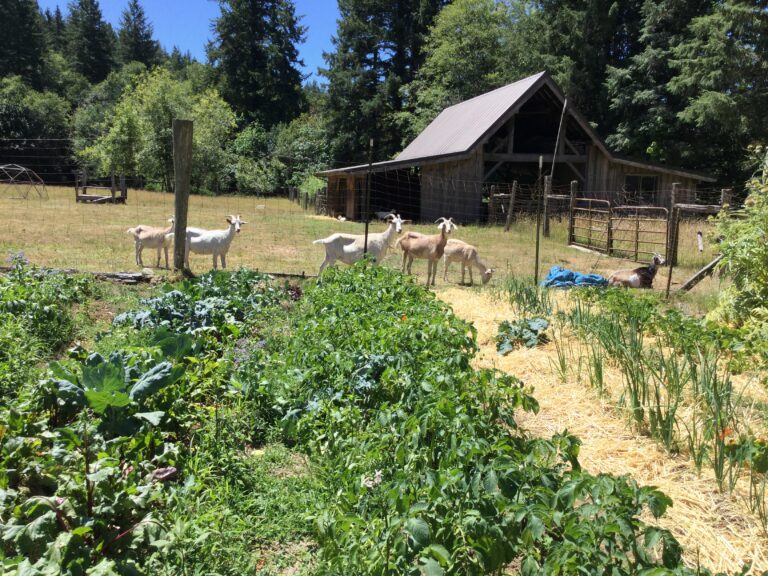
My Experience
“Be careful. I saw fresh cougar scat when I went on a run this morning.” Danny, the other new WWOOFer,
My arrival began with a mystery. A few weeks before, Coco, the milking goat, had vanished without a trace. She was in the pasture in the morning but didn’t show up for milking in the evening. No blood, no tracks, no compressed grass to show she’d been dragged. The two German Shephard sentries hadn’t barked. No one heard or saw a thing.
I took Danny’s advice when I went for a walk that led into the forest. I invited Sequoia and Spruce, the German Shepherds, to come with me. Cats won’t mess with dogs, right?! We walked through the bright leafy forest, the dogs happily lapping up new scents. If they weren’t concerned, then I wouldn’t be either.
Two days after I arrived, a chicken went missing during daylight hours. This is not the time chickens go missing. However, there was some evidence. Someone heard squawking. The dogs noticed something was up. Feathers were found on the ground. Hmm.
Everyone worried about Coco’s little baby, Dodanaly. Was he old enough to survive without his mother’s milk? He was on his own with no other kids to play with and not yet a part of the herd. He weakened. One morning Dan went out with a shotgun.
A few days later, Dan was showing the other two WWOOFers the headwaters of the little stream that runs through the property. There they discovered the bones of Coco and the chicken. This must have been the cougar’s daybed where it took its kill. Dan put up a camera and let the dogs run outside the pasture in the hope of driving off the cougar.
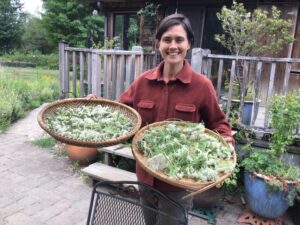 Back at the farm, Micha directed the most organized farm I’ve been on. Besides a well thought out daily work schedule, we also signed up for cooking and washing-up tasks. I went more for the washing up so I wouldn’t have to subject others to my cooking. Micha has kept a logbook since they started the farm. It has garden drawings showing the layout of the beds and charts of when things were planted and harvested. The log also includes weekly tasks so nothing would be forgotten. It is a nice history of the farm and a fun document to look through.
Back at the farm, Micha directed the most organized farm I’ve been on. Besides a well thought out daily work schedule, we also signed up for cooking and washing-up tasks. I went more for the washing up so I wouldn’t have to subject others to my cooking. Micha has kept a logbook since they started the farm. It has garden drawings showing the layout of the beds and charts of when things were planted and harvested. The log also includes weekly tasks so nothing would be forgotten. It is a nice history of the farm and a fun document to look through.
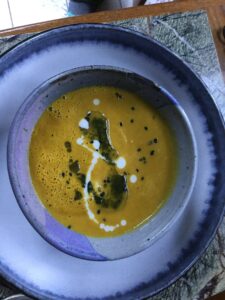 Airbnb guests arrived most days of the week. For breakfast and dinner, they were treated to an amazing feast. Cooking is a passion of Dan and Micha. It took hours to prepare the meals that were served. Since the preparations were done behind the scenes, I think the guests didn’t fully appreciate what they were eating. I saw what it takes to make a quality meal. The vegetables were freshly picked from their garden. The meat was locally sourced from quality farms. Then there is the chef’s knowledge of the chemistry of cooking and skill in tasting and adjusting seasonings to make perfection. And because our eyes play a part in enjoying a meal, it’s important to create an appealing visual presentation. The meals had all of these elements. Some of the other WWOOFers were good cooks too and helped out in the kitchen. I volunteered for clean-up.
Airbnb guests arrived most days of the week. For breakfast and dinner, they were treated to an amazing feast. Cooking is a passion of Dan and Micha. It took hours to prepare the meals that were served. Since the preparations were done behind the scenes, I think the guests didn’t fully appreciate what they were eating. I saw what it takes to make a quality meal. The vegetables were freshly picked from their garden. The meat was locally sourced from quality farms. Then there is the chef’s knowledge of the chemistry of cooking and skill in tasting and adjusting seasonings to make perfection. And because our eyes play a part in enjoying a meal, it’s important to create an appealing visual presentation. The meals had all of these elements. Some of the other WWOOFers were good cooks too and helped out in the kitchen. I volunteered for clean-up.
![]()
Once everything was laid out on the table and everyone was seated, Micha or Dan would describe each of the dishes, listing all the ingredients that went into it. I was always impressed and figured I’d never eat this well again.
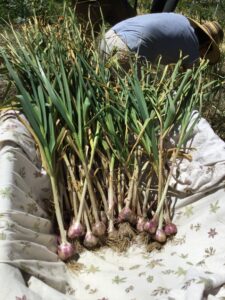 Pulling out root crops is like digging for buried treasure; you might find a gem on the end of the stem. Garlic is one of those jewels. It is a good money maker and a favorite crop of Micha and Dan. They grow a European variety that was passed down to them from the previous owner. But they are on an island of healthy soil. The area around the farm has been hit with a rust infection that kills garlic. So far Dan and Micha’s garlic has avoided it. They are careful to not let garlic from other farms on their property since it could harbor the bacteria. They would be sad to lose their special garlic.
Pulling out root crops is like digging for buried treasure; you might find a gem on the end of the stem. Garlic is one of those jewels. It is a good money maker and a favorite crop of Micha and Dan. They grow a European variety that was passed down to them from the previous owner. But they are on an island of healthy soil. The area around the farm has been hit with a rust infection that kills garlic. So far Dan and Micha’s garlic has avoided it. They are careful to not let garlic from other farms on their property since it could harbor the bacteria. They would be sad to lose their special garlic.
We pulled the garlic my first week on the farm. It was left in the upstairs part of the barn to dry. The garden beds were prepared for the next crop. Dan tilled the soil. Then, we measured out thirty-inch rows and eighteen-inch pathways. Raised beds were made using goat manure and straw compost. White plastic went over the beds. The heat it created would kill any weed seeds. In a couple weeks, brassicas, cabbage, kale, turnips, and radishes, were planted for a fall harvest. When they were done, garlic would be planted again. Full circle.

“I’m not good at arts and crafts,” Dan.
Once the soft-neck garlic was dried, all of us mounted the steep narrow steps to the top floor of the barn. As we sat cross-legged in a circle, Micha demonstrated how to French braid garlic. Braiding itself isn’t hard but doing it with twelve brittle stems while trying to keep the garlic heads lined up in a decorative fashion is. The barn filled with quiet, intense concentration, broken occasionally with an expletive. Looking around at adults struggling with this simple task, I got the giggles. There were some that excelled. I was impressed by the scorpion.
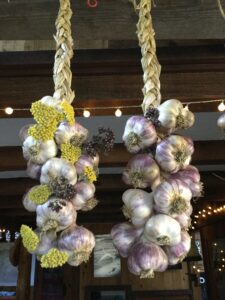
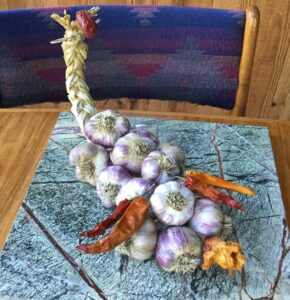
![]()
“Goats!” calls Micha. “Maa!’ responds Gerty.
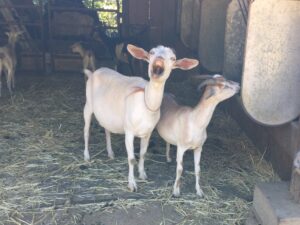 Micha is like Dr. Doolittle. She calls, “Goats!” and Gerty, a boisterous white goat, yells back “Maa!!!” All the animals on the farm are relaxed and friendly which reflects their human owners. Micha and Dan are kind and gentle and enjoy interacting with their animals.
Micha is like Dr. Doolittle. She calls, “Goats!” and Gerty, a boisterous white goat, yells back “Maa!!!” All the animals on the farm are relaxed and friendly which reflects their human owners. Micha and Dan are kind and gentle and enjoy interacting with their animals.
A duck house floated near the shore of the pond. Each day Micha went out to see if any of Joanne’s eggs had hatched. Births seem to happen on the full moon. I noticed the moon getting fuller and predicted the eggs would hatch in a day or two. On the day of the full moon, three tiny ducklings appeared. One was brown with a yellow chest. “Could be a khaki Campbell!” Micha said. In all, there were five ducklings. Two were brown, two gray, and, my favorite, a little yellow one. On the ducklings first outing in the pond, my little guy looked sick. Its eyes were half shut, its feathers ruffled, and it had low energy and couldn’t keep up with the others. Micha said it looked like it hadn’t gotten oils on its feathers yet. When mother ducks sit on their newborns, they transfer oils which keep their feathers waterproof. She worried the little duckling might be cold. I worried too. When we checked on them in the afternoon, my little guy was leading the flock through the underbrush. It was just younger and needed time to adjust.
Coquille is the small town nearest the farm. It was a logging town back in the day. Now it is mostly retirees. With a perfect location between the coastal mountains and the Pacific Ocean, it is a town that could revive. Micha and Dan, in their 30’s, are hoping to be the start of revitalizing farming in the area. The local seed saving group asked Micha to join the board. The people with expert knowledge are getting older and want younger people to start taking the reins. Towards the end of my stay, Micha and Dan had a garden party where people, young and old, from the turned out. It was apparent they had built strong connections with their new community.
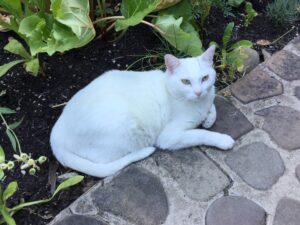 Luna is adorable. But deadly. A hummingbird killer. She jumps straight up and snatches the birds out of the air. Rather impressive for such a large cat.
Luna is adorable. But deadly. A hummingbird killer. She jumps straight up and snatches the birds out of the air. Rather impressive for such a large cat.
Dan likes to ferment things. We made fruit mead and sauerkraut while I was there. One of Dan’s dreams is to start a cidery and meadery. By law a farmer needs fifteen acres of apples to have a cidery. Dan only has half an acre. He wants to change the law so nano famers can sell their products too.

Micha is obsessed with fungal kingdom. So, of course, she grows mushrooms. One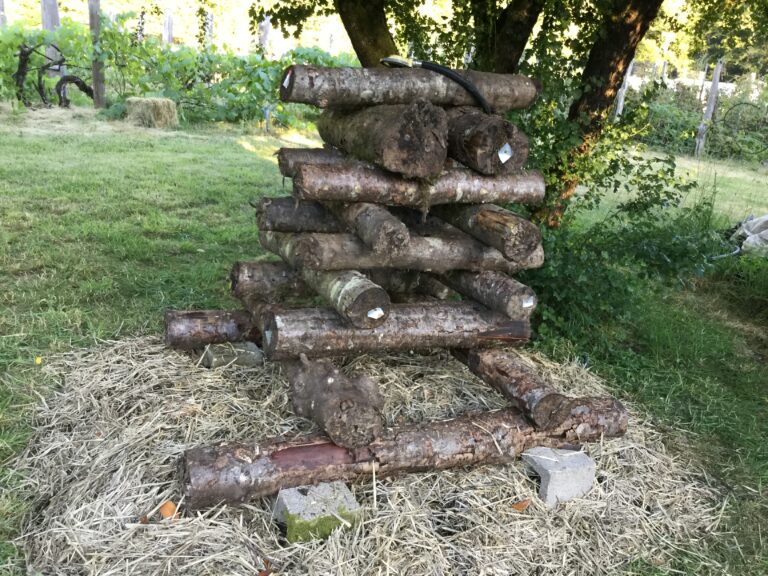 day we built a Lincoln Log structure with logs that had been inoculated with oyster and shiitake spawn. A sprinkler was set in the middle to get the logs saturated. Mushrooms are 90 percent water. To our delight, little mushrooms started popping up in just a few days. Something new to add to the Airbnb menu.
day we built a Lincoln Log structure with logs that had been inoculated with oyster and shiitake spawn. A sprinkler was set in the middle to get the logs saturated. Mushrooms are 90 percent water. To our delight, little mushrooms started popping up in just a few days. Something new to add to the Airbnb menu.
A different log structure didn’t turn out as well. Hügelkultur is making raised beds by putting alder or cedar logs at the bottom of a large hole, then adding brush, and finally putting soil on the top. The logs act like a sponge soaking up water. They breakdown over a period of years, adding nutrients to the soil. With the logs holding so much water, the garden won’t require watering. Even tomatoes can grow in this type of bed without needing to be watered. With summer droughts now the norm in the West, hügelkultur can be a sustainable way to grow food. But to all good things, there’s always a downside. The space between the logs makes a comfy nesting place for rats. Imagine the rats’ delight when fat juicy beets start descending towards their new home. Micha and Dan attempts at evicting the unwanted tenants have so far been unsuccessful.
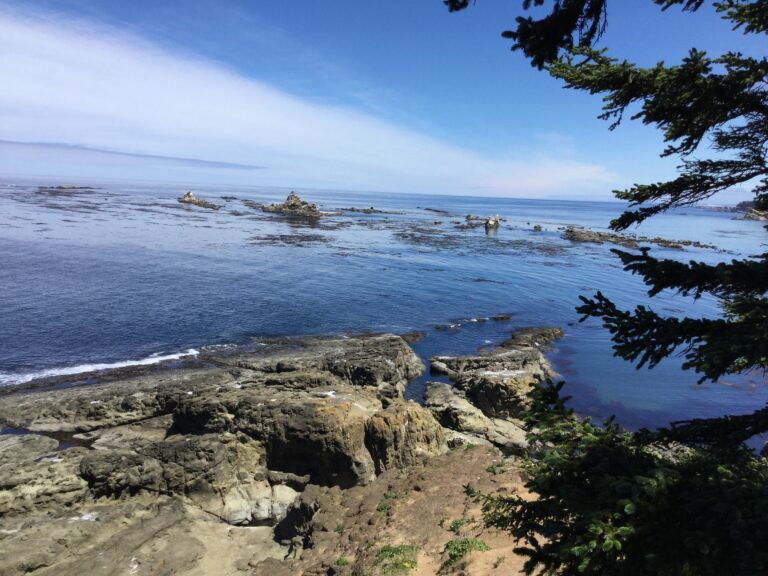 On my days off, I went to the coast. One sunny weekend I went to Cape Arago, a large headland that juts into the Pacific. Seals and sea lions bask on rocks off the coast. I camped at the noisy state park and took pleasant walks along the coastline. On another bluebird morning, I drove out to hike to the top of Marys Peak where sweeping views of the Pacific Ocean and the Coastal Range mountains awaited me. As I started winding up the mountain road, the sky turned to gray. Undaunted, I arrived at the tailhead and hiked up. At the top I peered into a white nothingness, in its own way as mesmerizing as watching the ocean fade into infinity. On the way down, I found a hike that led through a forest of the most interesting trees. The grayness enhanced their beauty. Back down the mountain, the sky returned to blue. I made my usual stop at a local brewery; beer is my way to complete a good day.
On my days off, I went to the coast. One sunny weekend I went to Cape Arago, a large headland that juts into the Pacific. Seals and sea lions bask on rocks off the coast. I camped at the noisy state park and took pleasant walks along the coastline. On another bluebird morning, I drove out to hike to the top of Marys Peak where sweeping views of the Pacific Ocean and the Coastal Range mountains awaited me. As I started winding up the mountain road, the sky turned to gray. Undaunted, I arrived at the tailhead and hiked up. At the top I peered into a white nothingness, in its own way as mesmerizing as watching the ocean fade into infinity. On the way down, I found a hike that led through a forest of the most interesting trees. The grayness enhanced their beauty. Back down the mountain, the sky returned to blue. I made my usual stop at a local brewery; beer is my way to complete a good day.
Micha and Dan gave me everything I want as a WWOOFer. We worked together, shared meals, and had laughter and told stories. There were lovable animals to cuddle, amazing food, artistic creativity, and lots of color. I enjoyed foraging for the first time, stacking mushroom logs, and learning about cob houses. With the flower garden landscaping and braided garlic bouquets hanging from the ceiling beams, this is the best-looking farm I’ve been on. An inspiration for what can be done.
